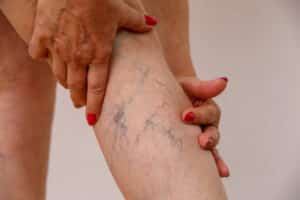
Spider veins are a common cosmetic concern, but for many women, they can also cause discomfort, including itching, burning, or aching sensations. Hormones play a significant role in the development of spider veins, which is why women are more likely to experience them than men. Discover how hormonal fluctuations from puberty to menopause, including pregnancy, affect vein health and circulation through changes in estrogen and progesterone levels.
At Michigan Vein Care Specialists in Ann Arbor, MI, Dr. Suzanne Jones, a board-certified surgeon specializing in phlebology, leads a highly trained team dedicated to advanced vein care. With thousands of successful vein procedures, she provides expert treatments to address spider veins, varicose veins, and other venous conditions, ensuring personalized care for each patient.
How Hormones Contribute to Spider Veins
Hormonal changes affect vein structure and blood flow, leading to an increased risk of spider veins. The key ways hormones contribute to vein issues include:
- Estrogen and Progesterone: These hormones relax vein walls, making them more susceptible to stretching and valve dysfunction.
- Pregnancy: Increased blood volume and hormone surges place additional pressure on veins, contributing to spider veins.
- Menopause: Declining estrogen levels weaken blood vessels, increasing the likelihood of vein-related concerns.
- Birth Control and Hormone Therapy: Synthetic hormones can affect circulation and lead to vein dilation.
Women experiencing hormonal fluctuations may notice new or worsening spider veins, particularly in the legs, due to the impact of these changes on blood vessels.
Why Women Are More Prone to Spider Veins
Women experience more hormonal shifts than men throughout their lifetime, increasing their likelihood of developing spider veins. Additional factors that contribute to this increased risk include:
- Genetics: A family history of vein issues raises the chance of developing spider veins.
- Prolonged Standing or Sitting: Jobs that require extended periods on the feet or sitting for long hours reduce circulation and contribute to vein problems.
- Weight Changes: Weight gain, particularly during pregnancy, increases vein pressure and may lead to vein enlargement.
Although men can develop spider veins, the combination of hormonal fluctuations and lifestyle factors makes women significantly more susceptible.
Managing Hormonal Effects on Vein Health
While hormonal changes are unavoidable, there are steps women can take to support vein health and reduce the risk of spider veins:
- Exercise Regularly: Movement promotes circulation and reduces pressure on veins.
- Wear Compression Stockings: These help prevent blood from pooling in the veins.
- Maintain a Healthy Weight: Excess weight increases strain on veins.
- Elevate Your Legs: Improving circulation by elevating the legs reduces swelling and discomfort.
Early intervention and lifestyle adjustments can make a significant difference in preventing and managing spider veins caused by hormonal changes.
Expert Spider Vein Treatments at Michigan Vein Care Specialists
If you’re concerned about spider veins and how hormones may be affecting your vein health, Michigan Vein Care Specialists in Ann Arbor, MI, offers advanced treatments. Call (734) 213-3700 today to schedule a consultation and explore personalized options for vein care.